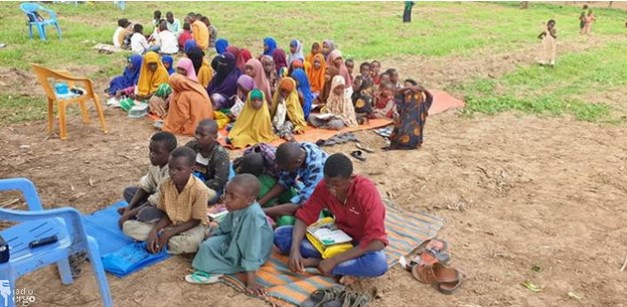
Friday November 12, 2021
Hussein Ali Yussuf, 17, went back to class on 16 October, although his school, Barey Elementary in Jowhar, is now operating outdoors, after the classrooms were destroyed by severe flooding that occurred in southern Somalia’s Middle Shabelle region in May.
Hussein had been hanging around at home for five months and says he is finding it hard to adapt to the makeshift learning environment.
“I used to study in a classroom with a desk and chair, but now I don’t have all that, I am sitting out here under a tree. It is problematic when it’s raining, or sunny, or windy! We can’t really study our lessons here,” he complained.
Around1,200 pupils in 10 villages across Jowhar are now studying outside because of flood damage to their schools that occurred during May and June. Barey Elementary is convening class one pupils in the morning, class two mid-morning, and class three in the afternoon. There is only one blackboard shared by all the groups.
Hussein was not expecting to resume his class three studies this year and admits having wasted most of his time off playing football. He is worried about what he missed.
“I used to feel like an ignorant person and wasted time just walking around the streets in the village. But now since we have been called back to study under a tree, I am going there to study,” he said.
Each of the 10 flood-damaged schools was given 20 solar radios by humanitarian organisation, CARE International, equipped with flash drives loaded with recorded course work to help the children to catch upon missed lessons.Every five pupils in each class were given one solar to share as a group.
Habibo Abdi Haji, a class four pupil at Gafey Elementary school, has been meeting up during her free time with the four others in her radio group to listen to the recorded lessons and take notes. Her family lost all the crops they had planted on their three-hectare farm in Gafey during the floods, which disrupted every aspect of village life.
“I have understood a lot from listening to the radio, including concepts we were taught but I had forgotten,” she said.Habibo’s two younger siblings in grade two are also learning under the same tree.
“The classroom was better than this tree! But our school was completely destroyed by the floods so now we are studying under this tree in the sun. When it rains, we have to run home because how could we continue to study then?” she said.
Jowhar education commissioner, Liban Bashir Omar, told Radio Ergo that the pupils, most of whom are from poor families, are getting free education. The schools destroyed by the floods were established in 2017 by Hirshabelle ministry of education with support from CARE and UNICEF.
“The main reason preventing us from rebuilding the schools is lack of funds. Secondly, the road connecting Mogadishu and Jowhar where the construction equipment would pass is cut off by the floods. However, we are planning to rebuild all the village schools destroyed in the floods once the water cutting off the road driesup,”the education commissioner said.
He noted the education ministry and the school managements together had decided that in the meantime the children should resume their studies outside.
“We have given the pupils books and backpacks to carry their books with support from UNICEF. We hope to rebuild the schools,”he said.
However, he noted that some children had not returned to their education as their families had been displaced by the most recent floods caused by the Gu’ rains that began in October.